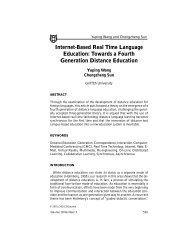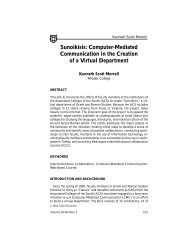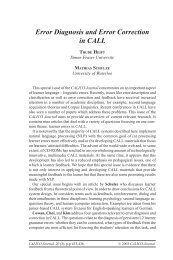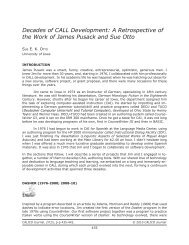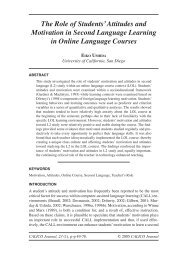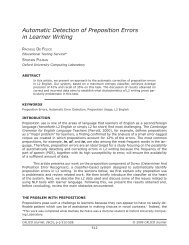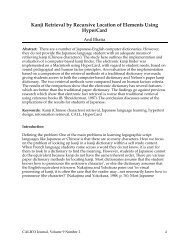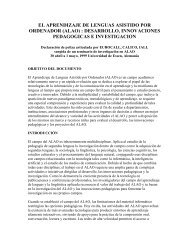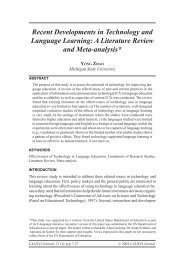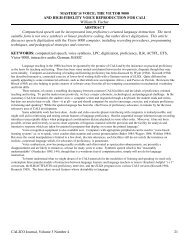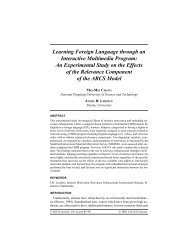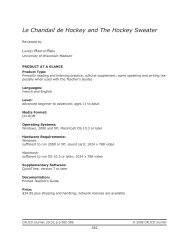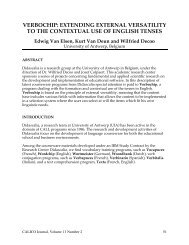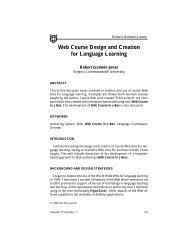Research on CALL and Distance Learning: A Briefly Annotated ...
Research on CALL and Distance Learning: A Briefly Annotated ...
Research on CALL and Distance Learning: A Briefly Annotated ...
Create successful ePaper yourself
Turn your PDF publications into a flip-book with our unique Google optimized e-Paper software.
G<strong>on</strong>zález-Lloret, M. (2003). Designing task-based <strong>CALL</strong> to promote interacti<strong>on</strong>: En Busca de<br />
Esmeraldas. Language <strong>Learning</strong> & Technology, 7 (1), 86-104. (http://llt.msu.edu)<br />
Keywords: materials development<br />
Summary: Outlines steps needed to create effective <strong>CALL</strong> materials, based <strong>on</strong> core sec<strong>on</strong>d language acquisiti<strong>on</strong><br />
principles; evaluates <strong>on</strong>e particular program in light of SLA-based criteria<br />
Goodfellow, R., Lamy, M.-N., & J<strong>on</strong>es, G. (2002). Assessing learners’ writing using lexical<br />
frequency. Re<strong>CALL</strong>, 14 (1), 133-145.<br />
Keywords: writing, vocabulary, French<br />
Summary: Finds mixed results in using lexical frequency measure to assess vocabulary; tool appears better for selfassessment<br />
but is of limited pedagogical value as currently employed<br />
Gorsuch, G. (2004). Test takers’ experiences with computer-administered listening<br />
comprehensi<strong>on</strong> tests: Interviewing for qualitative explorati<strong>on</strong>s of test validity. CALICO<br />
Journal, 21 (2), 339-371. (https://www.calico.org/p-5-CALICO Journal.html)<br />
Keywords: listening, assessment, English<br />
Summary: Uses qualitative interviews with six test-takers to examine reliability (<strong>and</strong> thus validity) of a<br />
computerized listening test<br />
Grace, C. (1998a). Retenti<strong>on</strong> of word meanings inferred from c<strong>on</strong>text <strong>and</strong> sentence-level<br />
translati<strong>on</strong>s: Implicati<strong>on</strong>s for the design of beginning level <strong>CALL</strong> software. The Modern<br />
Language Journal, 82 (4), 533-544.<br />
Keywords: vocabulary, French, software<br />
Summary: Argues for use of sentence level first-language translati<strong>on</strong>s to aid lower proficiency learners inferences<br />
about sec<strong>on</strong>d language vocabulary<br />
Grace, C. (1998b). Pers<strong>on</strong>ality type, tolerance of ambiguity, <strong>and</strong> vocabulary retenti<strong>on</strong> in <strong>CALL</strong>.<br />
CALICO Journal, 15 (1-3), 19-45. (https://www.calico.org/p-5-CALICO Journal.html)<br />
Keywords: vocabulary, French, software<br />
Summary: Differences in pers<strong>on</strong>ality type do not appear to influence vocabulary acquisiti<strong>on</strong> in a <strong>CALL</strong> program<br />
that provides first-language translati<strong>on</strong>s at the sentence level<br />
Grace, C. (2000). Gender differences: Vocabulary retenti<strong>on</strong> <strong>and</strong> access to translati<strong>on</strong>s for<br />
beginning language learners in <strong>CALL</strong>. The Modern Language Journal, 84 (2), 214-224.<br />
Keywords: vocabulary, French, software<br />
Summary: No gender differences found for short-term or l<strong>on</strong>g-term retenti<strong>on</strong> of vocabulary learned through<br />
sentence-level L1 glosses, nor for amount of time spent <strong>on</strong> lookup between genders<br />
Granger, S. (2003). Error-tagged learner corpora <strong>and</strong> <strong>CALL</strong>: A promising synergy. CALICO<br />
Journal, 20 (3), 465-480. file://localhost/(https/::www.calico.org:p-5-CALICO<br />
Journal.html)<br />
Keywords: grammar, French, corpora<br />
Summary: Describes use of tagged learner corpora to diagnose <strong>and</strong> treat comm<strong>on</strong> errors<br />
Grant, L., & Ginther, A. (2000). Using computer-tagged linguistic features to describe L2<br />
writing differences. Journal of Sec<strong>on</strong>d Language Writing, 9 (2), 123-145.<br />
Keywords: assessment, writing, grammar, English, tagging software<br />
Summary: Tagging software found to reveal many differences between essays rated at different proficiency levels,<br />
although human coding needed to completely identify all significant differences<br />
42



